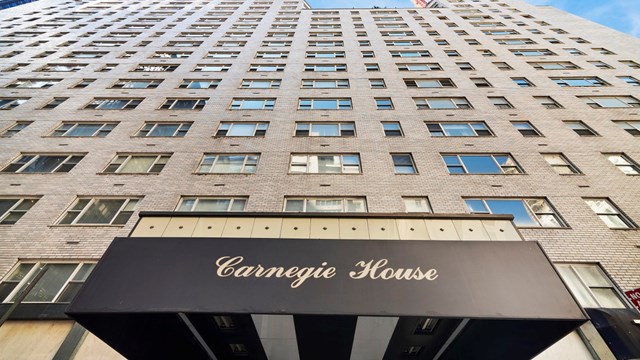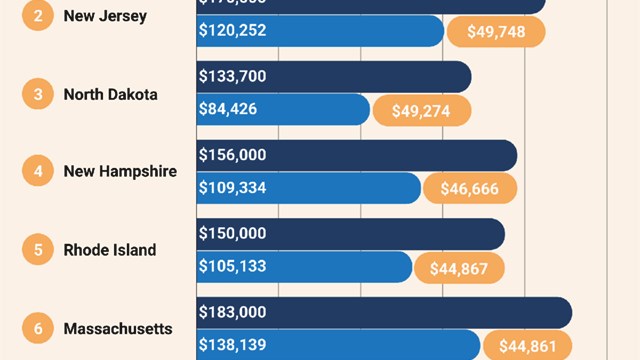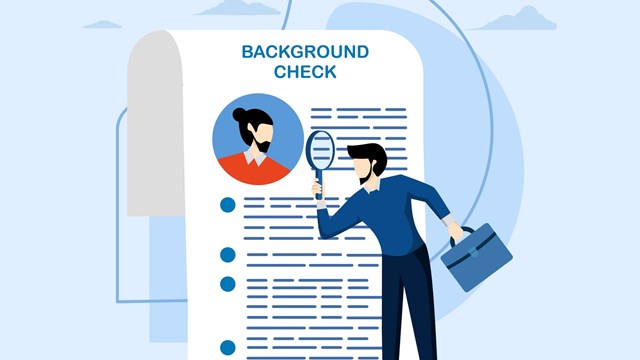Back in 1955, when the flight to the suburbs was going full blast and many city neighborhoods were deteriorating from lack of money and municipal attention, the Mitchell-Lama bill, named after State Sen. McNeil Mitchell and New York Assemblyman Alfred Lama, was signed into law.
The purpose of the program was to encourage the building of moderate-income housing, to keep more middle-class families within the state's cities, and to help stabilize city neighborhoods. And the program worked -- scores of Mitchell-Lama buildings (some 270 developments with nearly 140,000 apartments) were constructed throughout the 1950s, '60s and '70s, and provided housing for lower- and middle-income families. The projects developed under this program received real estate tax breaks and low interest loans and mortgages in return for keeping rents and purchase and resale prices far below market value for a period of time. After this period the co-op corporation could opt out of the program. Some say one of the real reasons for Mitchell-Lama in the first place was so that these buildings could stabilize borderline areas--clearing the way for the private real estate market to step in.
This period has changed several times over the years; it's now 20 years in most cases. Upon leaving the program, all subsidized loans and mortgages needed to be paid off and or refinanced conventionally. All real estate tax abatements and exemptions related to the initial finances, would no longer apply and real estate taxes would increase to that paid by similar cooperatives. A Mitchell-Lama technically pays what's called a "shelter rent" payment-in-lieu of taxes, which is derived through a formula which accounts for 10 percent of the annual rent roll of the shareholders plus the cost of utilities.
Many of the neighborhoods where Mitchell-Lama buildings were built have seen a dramatic increase in real estate prices, especially in neighborhoods that have become "upscale" making "buying out" more attractive than ever to many. If and when a Mitchell-Lama or a similar co-op does go private, those who own apartments can potentially sell them at market rates. If you paid $12,000 for your apartment, and are now seeing apartments all around you selling for $500,000 or $1 million or more, that's a powerful incentive for many people.
"I'm about to go into contract for a three-bedroom apartment for $1.275 million&--that's phenomenal," said Madeline Williamson, a broker for Prudential Douglas Elliman, handling apartments at 75 Henry Street, a now-privatized Article 5 co-op in Brooklyn Heights. "Studios are now ranging from $300,000 to $350,000."
Today, according to the Mitchell-Lama Residents Coalition, there are about 130 city-sponsored Mitchell-Lama developments, under the jurisdiction of the Department of Housing Preservation and Development (HPD); and approximately 94 state-sponsored Mitchell-Lamas, under the jurisdiction of the state Division of Housing and Community Renewal (DHCR). They range from the Bronx's giant Co-op City, with 35 buildings and 15,372 units, to Williamsburg's Northside Gardens, with just 41 units. To date more than 50 Mitchell-Lama city and state-sponsored rental developments have bought out, and according to HPD, 20 more are currently pending.
Mitchell-Lama buildings can be either rentals (where the buyout process is usually easier because a board's approval is not involved) and Mitchell-Lama co-ops. To complicate things further, there are other limited-equity, government-sponsored developments that are very similar to Mitchell-Lamas, but were built under other programs, such as "Article 5" developments.
Before a Mitchell-Lama or similar co-op can even begin to debate whether or not to buy out, there has to be two votes, according to Gary Sloman, director of operations for HPD's Division of Housing Supervision. In the first vote, shareholders must decide whether or not they want to spend money for a feasibility study, conducted by professionals. This usually needs just a simple majority, or 51 percent.
Paul Viggiano, president of Southbridge Towers, a Manhattan co-op that voted against privatization but may consider it again in the future, says this study "has to address what it will mean to the shareholders if the development goes private."
After the study is done, the shareholders have to have another election on whether they want to buy out, this time with a two-thirds majority. They then would have to file a "notice of dissolution" with the state that they want to leave the program.
In contrast to this complicated procedure, in a Mitchell-Lama rental building, the landlord must just inform the tenants that he or she is buying out of the program. Many tenants are concerned that this will mean staggeringly higher rents and possibly eviction, although those Mitchell-Lama rentals built prior to 1974 are still protected by rent stabilization laws. If the landlord then intends to convert the building to a co-op, tenants in most cases will be offered a modest discount from market value, what some would say, an insider price. One former Mitchell-Lama rental, West Village Houses, was transformed into an affordable co-op--although not a Mitchell-Lama one.
Whether you're talking about co-ops or rentals, buyouts and privatization are basically two terms for the same thing, says HPD's Sloman. He also believes the phenomenon is accelerating because it is essentially market-driven. "Conversion," he says, "can mean either that [taking the development from subsidized to private] or taking a rental to a co-op."
With so many Mitchell-Lama buildings well-past the 20-year buyout period, the question of privatization has become a popular subject these days for boards and shareholders alike. And Attorney David Berkey of the Manhattan law firm of Gallet, Dreyer and Berkey LLP has represented a number of buildings that are in process, including the 746-unit East Midtown Plaza on East 24th Street and Columbus Park Towers, which has 164 apartments on West 94th Street.
Columbus Park Towers considered privatizing in the late '80s, and they actually voted yes, says Berkey, but were stopped by HPD and required to wait an additional period of time before privatizing. Now the board is reconsidering it again and has started the wheels in motion. East Midtown Plaza officially voted to privatize and Berkey's firm is presently preparing a formal offering plan for the building.
"It's time. The law has reached the time period when the investors are allowed to recoup their reward and cooperators are allowed to go private so they're doing it."
The city should not think of this phenomenon as lost affordable housing but an opportunity to reap the benefits of a strong real estate market, Berkey says. All of the underlying subsidized mortgages have to be repaid and a substantial amount of tax revenue will be generated as more and more Mitchell-Lamas privatize, he says, paving the way for the construction of additional affordable housing.
"From what we've seen, when the mortgages are paid off and the buildings are put on full tax payrolls, there should be sufficient money that goes back to the city of New York to seed a new round of Mitchell-Lama construction, if they wished."
Another area is that of realty transfer fees. "They'll be collecting transfer taxes on the sales in substantially higher amounts so there's a lot of additional income coming into the city of New York in buildings that go private."
What questions do boards and shareholders need to ask and/or consider when considering privatization? "That's all part of the study&--it's financial," says Viggiano, whose Southbridge development is located near the South Street Seaport. "To me, if I decide to stay in, will my rent [maintenance charges] go higher, lower, or stay the same if it goes private?" (Viggiano says he still plans to raise the issue of privatization again despite the earlier "no" vote, because he feels it's the job of a board to keep options open to shareholders.)
Indeed, the financial objection is the main argument raised by those cooperators who are uneasy about a buyout. "Some people who don't wish to cash out [sell their apartments] will have to take more money out of their pockets on a regular basis," says Sloman. On the other hand, purchasers, however, will be able to borrow against their enormous increases in equity in the form of a reverse mortgage, conventional mortgage or a home equity loan to pay the increase while still maintaining substantial equity in the future. Financial reasons are an important consideration. "Another issue," Sloman says, "is that income-eligible senior citizens who are getting certain subsidies under Mitchell-Lama may no longer be eligible to receive them."
Myron Holtz, a housing consultant with Herrick Feinstein LLP, and a former deputy commissioner at DHCR, said that a buyout plan has to be very carefully thought out, whether it is a rental or a cooperative corporation. "There's no question when you buy out, there is going to be increased maintenance. The question is who should pay that increased maintenance and how can you do it so that the least people are hurt," he says. "Who is going to protect the people that really don't have the money? The real question is how do you address the concerns of those people."
Residents who choose not to participate may also object, according to Williamson, because they believe that other middle-income people should have the same chance for affordable housing that they had when they first bought or rented their apartments.
What obligations does the board have to disclose the various stages of the buyout discussion to shareholders? Technically, says Sloman of HPD, "The boards do not have to disclose anything to shareholders--we don't tell them what to say except to give certain notices. But any board that is pushing toward a buyout that doesn't reveal the findings of a feasibility study is rather foolish."
Apartment resale prices under the Mitchell-Lama program are limited to the shareholder's 'original equity' i.e., what they originally paid in, plus of portion of the amortized mortgage principal for the amount of time they lived there. Apartments cannot be resold on the open market but rather must be resold to the housing cooperative and go to the next person on the waiting list.
The one advantage a Mitchell-Lama co-op corporation has in privatizing their own building is that it can determine the terms by which cooperators, who do not wish or cannot afford to purchase, can continue to live in their apartments. Money, says Holtz, can be raised through flip taxes or by the sale of vacant apartments for this purpose. "The co-op will have to make some provisions," he says. "They may have to buy their shares and let them stay there at the same maintenance level. The co-op's plan has to address what happens to those who do not choose to participate. There will be an increase in the operating expenses and an increase in the debt."
There are a number of scenarios that ultimately could take place, but Sloman says that whatever arrangement is consummated it is ultimately up to the board and its shareholders to figure out. For example, one particular co-op that is contemplating privatization, is considering giving a "lifetime tenancy" to those cooperators who do not wish to participate in the buyout.
Fellow cooperators may also choose to subsidize non-purchasing tenants with the expectation that down the road their apartments can be sold for substantial profit, which will benefit the co-op.
Berkey agrees that the board has to come up with a plan to handle those either unable to afford or unwilling to participate in the buyout. "What we've recommended and almost every building has adopted that we know is a provision where if they don't opt to purchase their unit or do the exchange of shares for shares in the new co-op, that they could exchange their occupancy agreement in shares for a long-term leasehold, which in essence protects a tenant in the way a rent-stabilized lease would do."
About the financial considerations, Berkey says the results of the feasibility study will usually determine how successful the privatization will be. "There are people that are concerned that maintenance will go up although it's not necessarily the case that maintenance will go up--because a lot of the buildings when they prepare their studies whether or not to go private implement in their plans a substantial transfer fee or flip tax--so that there's a lot of money that comes back to the cooperative from the transfer fee. East Midtown Plaza, for example, was considering a 45 percent transfer fee--so you can imagine that there's a substantial amount of money that comes back to the building which would help keep maintenance low."
The benefit of selling your apartment, of course, doesn't exist in a state-subsidized rental building whose landlord decides to "buy out." Manuel Carrero, president of the tenant association at Independence Plaza North in Tribeca, says his group "had to force the issue with the landlord to negotiate an agreement with us to protect us a little better."
The group went to the City Council, which was considering legislation that would make it more difficult for landlords to leave Mitchell-Lama. At that point, the landlord "decided to negotiate something with us privately, rather than face some serious financial consequences," Carrero says.
Now, thanks to the agreement reached in 2004, the Independence Plaza North tenants are still paying below-market rents, courtesy of federal enhanced vouchers, known as "sticky vouchers," or, in other cases, a city-sponsored Landlord Assistance Program. Many tenants there would love to have the opportunity to buy their apartments--but that opportunity hasn't come yet.
And in a recent announcement, the United Tenants Association of Cathedral Parkway Towers won a thirty-year battle to take over ownership of their 309-unit Mitchell-Lama development between 109th and 110th Street on the Upper West Side. The Nelson Management Group was selected to redevelop the property and the twin-buildings were refinanced with help from the state and a private mortgage lender that specializes in financing low-, middle- and moderate-income housing. In order to keep rents affordable, the federal Department of Housing and Urban Development (HUD) is providing enhanced vouchers to 270 income-qualified residents at Cathedral Parkway to help offset the higher rents that will now be charged. The tenants association has also created an in-house concession to raise money to assist those households that are not eligible for the vouchers. Developer Robert Nelson says the enhanced vouchers will help almost every tenant and the rents, though raised significantly, are nowhere near at market-rent. "It enabled us to raise the value of the building and thus obtain money to do construction and all of the things that were needed for the building. Those tenants that didn't receive an enhanced voucher will receive an internal subsidy from the increased cash flow of the building," according to Nelson.
He also believes that privatization is a natural outcome, even if it means some loss of the city's housing stock. "I have ambivalent feelings about it. I think on the one hand the state of New York and all of the legislators at the time, who enacted the Mitchell-Lama program when they did in the late 1950s, had an objective, they wrote up a law, they had it passed, they provided thousands upon thousands of affordable housing units in New York State.
"It's one of the most successful programs in the country. But there was a contract and the contract stated that after 20 years in the program, the owner had the right to prepay its Mitchell-Lama mortgage and go out of the program," Nelson says. "To now try and have certain politicians say that they're going to change the rules of the game in some fashion is irresponsible. A contract is a contract is a contract. I think it's wrong to change the rules."
When it comes to Mitchell-Lama co-op conversions, the drawback for those residents who don't want to sell is obvious. "If you continue living there, you will be paying more money," agrees Sloman.
Taxes are one factor that will increase maintenance. "Taxes [on the building] will go to full taxes immediately--Mitchell-Lama pays 10 percent of shareholders' income as taxes, or less, but there is no phase-in [after a buy-out]," says Sloman. "The day after you buy out, you are paying full taxes."
A second factor is that a co-op must pay off its subsidized loans and mortgages, which means that it must finance this with a new mortgage through the private market, adds Sloman. In some cases, today's interest rates are less than the rates on existing mortgages created by the Mitchell-Lama program, so the actual effect of the refinancing must be evaluated on a case-by-case basis. As far as equity is concerned, the Mitchell-Lama program required that cooperatives sell the apartments back to the cooperator at essentially the same price they paid, and after privatization, apartment owners can sell at current market value.
When a Mitchell-Lama or other subsidized co-op decides to initiate a study about "going private," and if and when the co-op actually decides to do so later on, experts--such as lawyers, accountants and financial advisers-- are an absolute must to help board members navigate the process.
Speaking about Southbridge, Viggiano says, "We'll have to hire an attorney who understands Mitchell-Lama inside and out, and also hire financial people who are familiar with all the rules and regulations of the state as they pertain to finances. We'll need a 'due diligence' analysis of what it means to go private, being that we have certain tax abatements. Do we lose these abatements, and if so, how do we make up the lost savings?"
Berkey, however, sees privatization as a positive outcome. "I think it's a win-win situation for the building and for the residents. And it can be also for the city if they take the money and they use it to rebuild new middle income housing."
How long does the entire buy-out process take for a co-op? That's a tricky question. According to Sloman, although many Mitchell-Lama rentals have left the program and many more co-ops are contemplating it, only one Mitchell-Lama co-op (the Anthony J. Contello in Brooklyn in 1989) has actually done so as of this time. Its namesake, Contello III, also in Brooklyn, is currently considering privatization, according to Sloman. Another Mitchell-Lama co-op left the program in 2002, but the reason was that its mortgage term had run out.
A number of other, non-Mitchell-Lama, limited-equity co-ops have "bought out," including 75 Henry Street, and Williamson says, "the process has taken several years."
And the bottom line says Berkey is to remember that there still is a sense of community in these buildings so that concerns about privatization will ultimately be addressed. "I haven't seen any where there's been any aggressive action taken by a co-op that was once a Mitchell-Lama to force people out. I don't think that's ever been considered. They are neighbors and friends and there's no reason to do it."
So if your board wants to explore the possibility of going private, you would be well advised to start looking into it now, and assembling a strong team of financial and legal advisors your board will need to assess the feasibility of a buyout and help both your board and your shareholders navigate what can be a very long, often complicated process. The more information your board, management, and shareholders have, the smoother your transition will go, and the less chance there will be for acrimony and friction between neighbors.










21 Comments
Leave a Comment